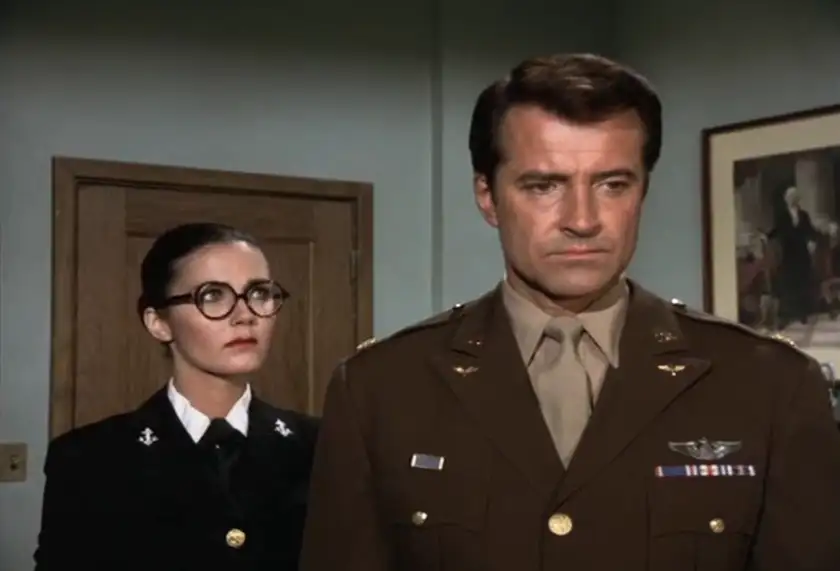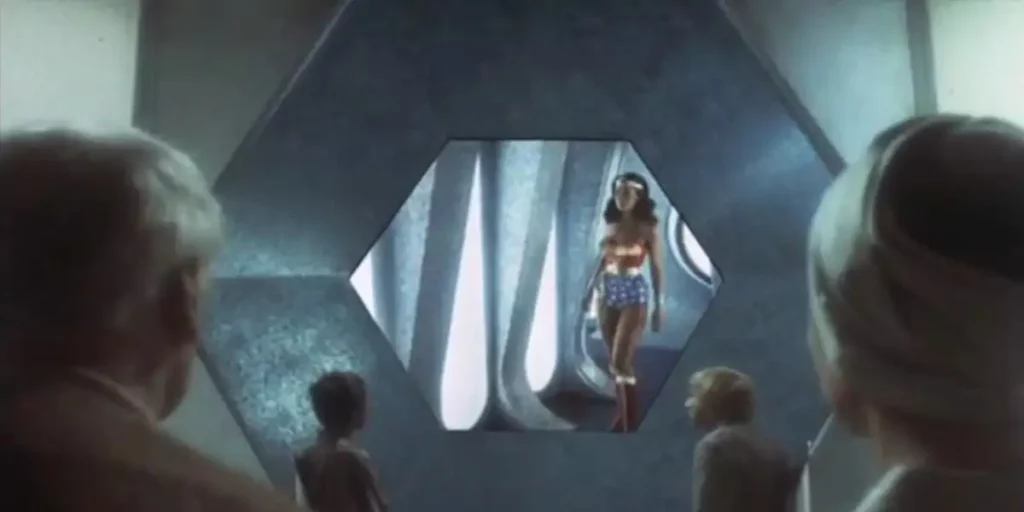Wonder Woman (1975) episode 11 slacks off the tension previously gained, but remains curious as a ‘70s appraisal of World War II.
“Surely by now you’ve seen the potential for good in humans. Wonder Woman is the hope of the human race, the hope of this entire misguided planet.” – Andros
The first few minutes of Wonder Woman (1975) episode 11 (“Judgement from Outer Space: Part Two”) try their damnedest to maintain the tension built previously. Wonder Woman (Lynda Carter) has found Andros’ spaceship, intent on sending a message to the Council of Planets. A message like: “please don’t kill us all, some of us are good!” Andros himself (Tim O’Connor) has been captured by the Nazis, and the Americans want to go get him back. Meanwhile, the council, lightyears away, are bickering amongst themselves, with their hands over the big red ‘destroy humanity’ button. Things are looking rather hopeless.
Then, a two-week time skip takes all the wind out of the sails. Wonder Woman returns to the war department as Diana Prince, the Americans have formed a plan for retrieving Andros, and the Nazis have gotten the alien bloke back to Germany, who’s now sitting comfortably in an interrogation centre.
If it wasn’t for what occurs when Wonder Woman finally catches up to Andros on her own rescue mission, and the consequence of it, Wonder Woman episode 11 would feel quite an insubstantial follow-up to “Judgement from Outer Space: Part One”. Simply, Andros doesn’t want to leave. His mission is to assess all of humanity, and so he’s as happy with the Nazis as he was with the Americans. Wonder Woman, now a prisoner alongside him, is near-incredulous.
Has Andros not yet realised how evil these people are? Does he not know that they operate concentration camps? To this Andros compares the Nazis treatment of their prisoners to the Americans treatment of the Japanese, and declares that war, injustice, violence and torture are not the flaws of a single nation, but the flaws of humanity as a whole.
They’re certainly some words to think about, and it seems that Wonder Woman episode 11 largely agrees with him. The only difference in portrayal that I caught between the Allies and the Axis, as it concerns Andros, is that the Americans come to believe he is indeed an alien, whereas the Germans are steadfast in their belief that he is a scientist helping the Allies create nuclear bombs. Whether that’s supposed to paint the Allies as more trusting than the Nazis, or the Nazis as more rational than the Americans, I’m not sure. But, it’s not until much, much later in the episode, when the Nazis threaten to torture Wonder Woman if Andros doesn’t tell them about these bombs, that the alien finally starts to sour on his captors.

Wonder Woman episode 11 might not be as steadily tense as the previous then, but it is fascinating. The focus is again solely on Andros’ perspective of Earth, and that is utilised in this episode to voice some convicted anti-war opinions that’d likely receive a bit of backlash today. His views might be labelled as Nazi-sympathetic, be construed as a belittlement of war, or something like that. If possible, I’d love to hop back in time and see how this episode was received by the average American household in January of 1977. Did they find it confrontational, or to mirror common belief? Perhaps a key thing is that, regardless of what they thought, they didn’t run to public spaces and perpetuate the world’s anger with exaggerations of their opinion.
“Judgement from Outer Space” does however, after all that, end on a sort of anti-climax. Andros manages to swing it with the Council of Planets to give humans another fifty years to prove themselves civilised – what with them being as early in their development as they are. Then the episode concludes with Andros telling Wonder Woman that he’ll see her again in 1992, and with the both of them hoping Earth to be a better place by then. It’s all quite sobering.
I suppose ‘92 still felt a little way off in ‘77, but it’s been another thirty years since that as of this writing, which makes me feel unexpectedly reflective. Did civilization improve much between the 1940s and the 1990s? If Andros came about today would he find a world finally rid of violence and torture, of greed and injustice? No. No he certainly wouldn’t. That Council of Planets would put us down in a heartbeat.
Episode of Wonder Woman (1975) is now available to watch on digital and on demand.

